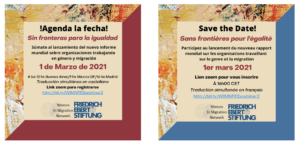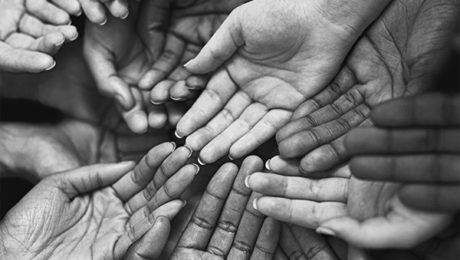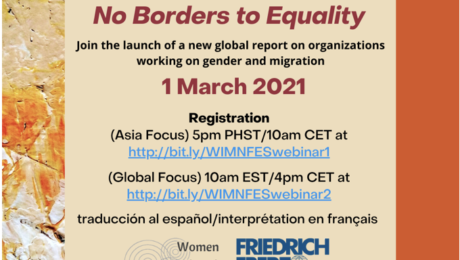Macroeconomic Policies, Care and Gender in the Post-COVID Era: Part I
Faculti, an organization that presents digital media from leading experts and academics outlining their work, recently released a digital presentation by the Care Work and the Economy Principal Investigator Dr. Maria S. Floro entitled “Macroeconomic Policies, Care and Gender in the Post-COVID Era.” This discussion delves into the foundation of project itself, its context, the analytical tools utilized in the research, as well as the external factors that have served as the catalyst for the work being done.
The Care Work and the Economy Project was developed after a group of feminist economists observed that in the effort to reduce gender gaps in economic outcomes, as laid out within the United Nations Sustainable Development Goals, there were aspects of care work that needed to be addressed. The project includes 35 scholars from all around the world that are working to develop innovative analytical tools. The research has been applying and testing these tools in South Korea, a country that quickly industrialized in the 70s and 80s and therefore witnessed a very rapid demographic change in fertility and life expectancy.
The care economy, which is inclusive of caring for those that cannot care for themselves, underpins the production of all economies within society. This begins with the fact that if people stopped having children, which require care, then the economy would come to a halt due to lack of labor force. Generally, care work has a tendency to be undermined through a lack of gender awareness in macroeconomic modeling, which does not address care needs in any adequate manner. This aspect is also neglected within the policy making discourse, with the current economic paradigm failing to take into account the necessity for care work to achieve economic growth.
Economic models that display growth also fail to take into consideration social elements, making the assumptions that, for example, children will be cared for despite the lack of social investment into care. However, with care work there comes social, political and economic significance. The Care Work and the Economy project is working to demonstrate what a care focused macroeconomic model can reveal through the implementation of the analytic tools being developed and implemented through the research.
The absence of the care economy within macroeconomic models is in large part due to it being “invisible” since the work often unpaid. This has led to the neglect of care needs despite unpaid care work providing indispensable services in terms of economic activity and growth. The result is an emerging care crisis that has manifested itself in terms of uncared for elderly, sick and children. Furthermore, the crisis has provoked a form of silent protest against long unpaid work hours performed by women, leading to a decline in marriage and fertility rates. This in turn has resulted in a reproduction crisis.
The Care Work and the Economy project researchers are developing and using innovative analytical tools to bring care to the forefront, along with a deeper understanding of the nature of care work, while illustrating the intersectionality between care provisioning, economic growth and distribution. Although these analytical modeling tools are currently being applied in South Korea, the project believes they can be adopted and implemented into other countries as long as the provision of care is taken into context of those countries. The project research shows that governments have an important role and duty to invest in care provisions as well as comprehensive national care plans. One of the key findings is that it is important to take into account demographic change and climate change along with economic and structural changes taking place in policy making. This is a tall order but necessary to sustain economies and provide a future for next generation.
Link to Part 2 of this blog here.
This blog was authored by Jenn Brown, CWE-GAM Communications Assistant
- Published in COVID 19, Elder Care, Expert Dialogues & Forums, Feminist Economics, Field Work, Gender-Aware Macromodels, South Korea
Save the Date: Women & Migration Global Mapping Report
On March 1st the Women in Migration Network and Friedrich-Ebert- Stiftung is launching a new report mapping organizations working on gender and migration around the world “No Borders to Equality.”
This new report has mapped over 300 organizations around the world working at the intersection of gender and migration. It is based on a survey and interviews that identify key priorities, concerns, advocacy and mobilization, and which reveal the tremendous potential and importance of bringing a gender perspective to the dynamic issues of migration today.
In addition to the report (which will be available in English and with an Executive Summary in English, Spanish and French), an interactive website is being developed to help in identifying and locating these key groups in the various global regions.

To accommodate global time zones, the launch event will take place at two different times. You can register for either event:
(Asia Focus) 5pm PHST/10am CET
Register at: http://bit.ly/WIMNFESwebinar1
(Global Focus) 10am EST/4pm CET
Register at: http://bit.ly/WIMNFESwebinar2
– traducción al español
– interprétation en français
Be sure to attend this exciting event to learn more.
- Published in Events, Gender Inequalities, Policy Briefs & Reports
Making the Biden-Harris Economic Recovery Plan Gender Responsive
A recent Gender & COVID-19 brief (also a sign on letter) “Making the Biden-Harris Transition Plan for COVID-19 gender-responsive” outlines how the Biden-Harris Transition Plan in the US can be made more gender-responsive. The brief is a starting point in highlighting the potential within the Biden-Harris Transition Plan, using economic recovery as an entry point, with recommendations based on the best practices for feminist economic recovery from COVID-19.
The Biden-Harris Economic Recovery Plan is constructed around four challenges which must be overcome to rebuild the nation. The brief applies a gender lens for each challenge, emphasizing that for these efforts to be truly equitable, it is critical that they are not implemented in isolation and an intersectional gender lens is used in policy making and interventions.
- Mobilize American manufacturing and innovation to ensure that the future is made in America, and in all of America: Targeted support to business owners from under-represented groups in the forms of emergency funds, skills, training and mentorship; and direct funding to businesses in women-majority sectors, including caregiving and social enterprises, should be a centerpiece of the policy.
- Mobilize American Ingenuity to build a modern infrastructure and an equitable, clean equitable future: Investment in care infrastructure is also green, as it supports jobs for women (in the care sector) and men (in the construction sector), and provides services communities need to thrive. Implementing stimulus programs focused on ‘green jobs’ should proactively plan for gender equity and include formal programming for women, with special emphasis on displaced workers, communities of color, and women who are in recovery from incarceration.
- Mobilizing American talent and heart to build a 21st century caregiving and education workforce: Prioritize universally accessible, free (or highly subsidized) childcare and long-term elder care as central to its economic recovery plan. This can in part be accomplished through the designation of direct public funds to existing regulated and licensed care services. Direct public funds should also be used to invest in measures to keep workers safe and expand the number of care spaces available. Importantly, many workers who provide the backbone of the care economy are informally employed, wherein they have limited or no access to social protection. As such, government assistance schemes should be expanded to include family and informal caregivers, and an expedited path to permanent resident status should be created for precarious immigrant care workers so that they can access those schemes. This has a much greater effect than simply creating employment in the care sector but facilitates women’s participation across the economy.
- Mobilize across the board to advance racial equity in America: There can be no gender justice while there is racial injustice. Racial and gender inequities are inextricably linked to the economy. For example, Black, racialized, and immigrant women are disproportionately represented as personal support workers, cleaners, and in other essential but low-paid occupations – many of which are in the informal economy – that do not provide paid sick leave or family leave.
READ FULL BRIEF: Solomon A, Morgan R, Wenham C, Smith J, Nacif Pimenta D, Mueller V, Herten-Crabb A and Hawkins K (2020) Making the Biden-Harris Transition Plan for COVID-19 gender-responsive, Gender and COVID-19 project
This blog was authored by Jenn Brown, CWE-GAM Communications Assistant



